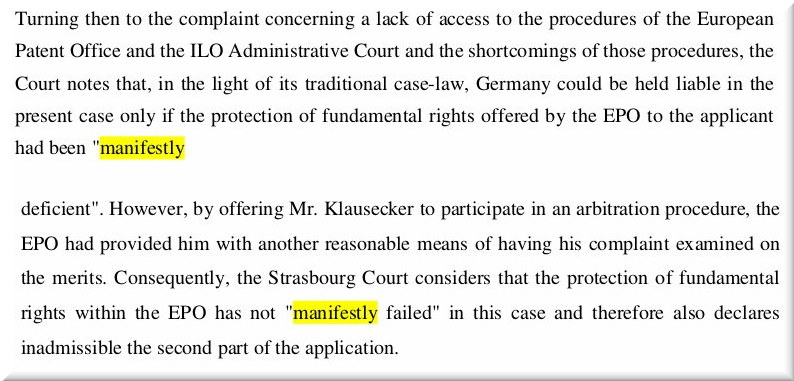
[PDF] | French [PDF]

A FEW days ago, on the very last day of April, the staff union of the EPO (also known as "SUEPO") cited an old paper from Robin Silverstein. We're guessing that it relates to the case against EPO management ('mini' Sárközy and his Vice-Presidents), to possibly be taken up by ECHR (we covered it several times last year). Yesterday SUEPO cited another old or undated document, this time the words of ECHR President Guido Raimondi, who is based in Strasbourg. We might soon cover another Battistelli scandal, this time in relation to Strasbourg itself. There's also another Battistelli scandal in Saint-Germain-en-Laye (to be covered here next week).
"We might soon cover another Battistelli scandal, this time in relation to Strasbourg itself. There's also another Battistelli scandal in Saint-Germain-en-Laye (to be covered here next week)."Will ECHR hear and deal with EPO abuses? The "[p]osition of ECHR President Guido Raimondi on the case law of the European Court of Human Rights on international Civil Service law," says SUEPO, includes phrases like the above, including: "In a neighbouring register, the Klausecker case did not lead to a much happier solution for the applicant. In this case, he had been disabled since the age of 18 as a result of an accident that caused him to lose one eye, one hand and part of the fingers of the other hand. Having graduated with a degree in mechanical engineering, he worked as a research assistant at a university. After applying to work at the European Patent Office in Munich and passing the examinations to become a patent examiner there, he was not admitted to the post in 2005 on the grounds that he was not physically fit. He lodged an appeal against this decision with the European Patent Office and then with the Administrative Tribunal of the International Labour Organisation, which were rejected in 2005 and 2007 respectively in so far as candidates for a post are not entitled to lodge appeals of this type. Since the European Patent Organisation (EPO, of which the European Patent Office is a member) enjoys immunity from jurisdiction before the German civil and labour courts, the person concerned brought the case directly before the Constitutional Court, which, in 2006, ruled that his appeal was inadmissible and declared that it lacked jurisdiction to judge it. Subsequently, the European Patent Office proposed to the applicant to have the dispute decided by an arbitral tribunal, an option it refused in 2008 on the ground that this procedure would infringe essential procedural guarantees, in particular the right to a public hearing within a reasonable time. The applicant then brought the case before the Strasbourg Court on the basis of Article 6(1) of the ECHR.
"As regards the lack of access to German courts, the Court finds, first of all, that granting the EPO immunity from jurisdiction before the German courts was intended to ensure the proper functioning of that international organisation and thus pursued a "legitimate aim". In determining whether limiting the applicant's access to German courts was proportionate to that objective, the Court considers it decisive to determine "whether there was any other reasonable means of effectively protecting his rights under the Convention". However, it considers that the applicant did have another means at his disposal, since he had been offered participation in arbitration proceedings. The Court notes in particular that, under the arbitration contract proposed by the EPO, the arbitrators would have decided the dispute on the basis of the rules which the ILO Administrative Tribunal would have applied had it been competent. In its view, the mere non-public nature of the hearing before the arbitral tribunal - where the parties could be represented by counsel - did not make the arbitration procedure a "poor substitute for proceedings before a national court".
"Since the applicant had another reasonable way to protect his rights under the ECHR, the limitation of his access to the German courts was proportionate; this first part of the application is therefore rejected for manifest lack of foundation.
"All these French connections do matter and are certainty relevant to the EPO; there's a reason why it took nearly a decade to hold Nicolas Sárközy accountable for pretty serious crimes.""Turning then to the complaint concerning a lack of access to the procedures of the European Patent Office and the ILO Administrative Court and the shortcomings of those procedures, the Court notes that, in the light of its traditional case-law, Germany could be held liable in the present case only if the protection of fundamental rights offered by the EPO to the applicant had been "manifestlydeficient". However, by offering Mr. Klausecker to participate in an arbitration procedure, the EPO had provided him with another reasonable means of having his complaint examined on the merits. Consequently, the Strasbourg Court considers that the protection of fundamental rights within the EPO has not "manifestly failed" in this case and therefore also declares inadmissible the second part of the application."
There's a lot more in there (10 pages in the translation of the original). Assuming SUEPO's site is resilient (with Battistelli leaving the Office in less than 2 months), we haven't chosen to make local copies. Battistelli is soon going to Strasbourg, which is where his next employer is based, not just ECHR. Incidentally, Strasbourg is also where Battistelli's 'bulldog' (Željko Topić) faces legal ordeals. The case was filed in Strasbourg because Croatia's courts are notoriously unresponsive and the system served to cover up Topić's abuses (because they go all the way to the top, i.e. the national government). Can a 'French' court in Strasbourg be expected to deliver justice in a case which implicates so many powerful people in France, perhaps also a former President, a Parisian Mayor and so on? ⬆